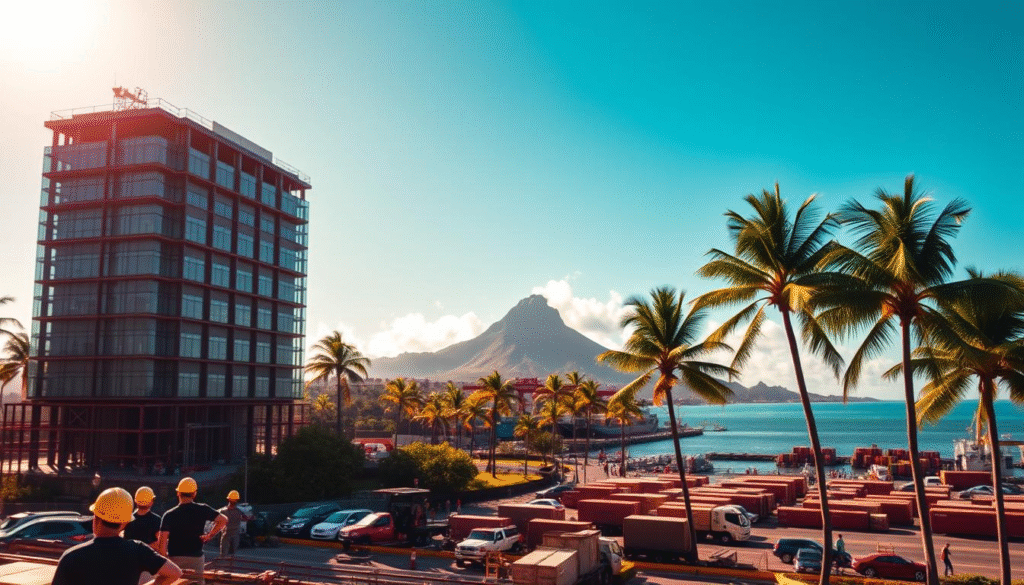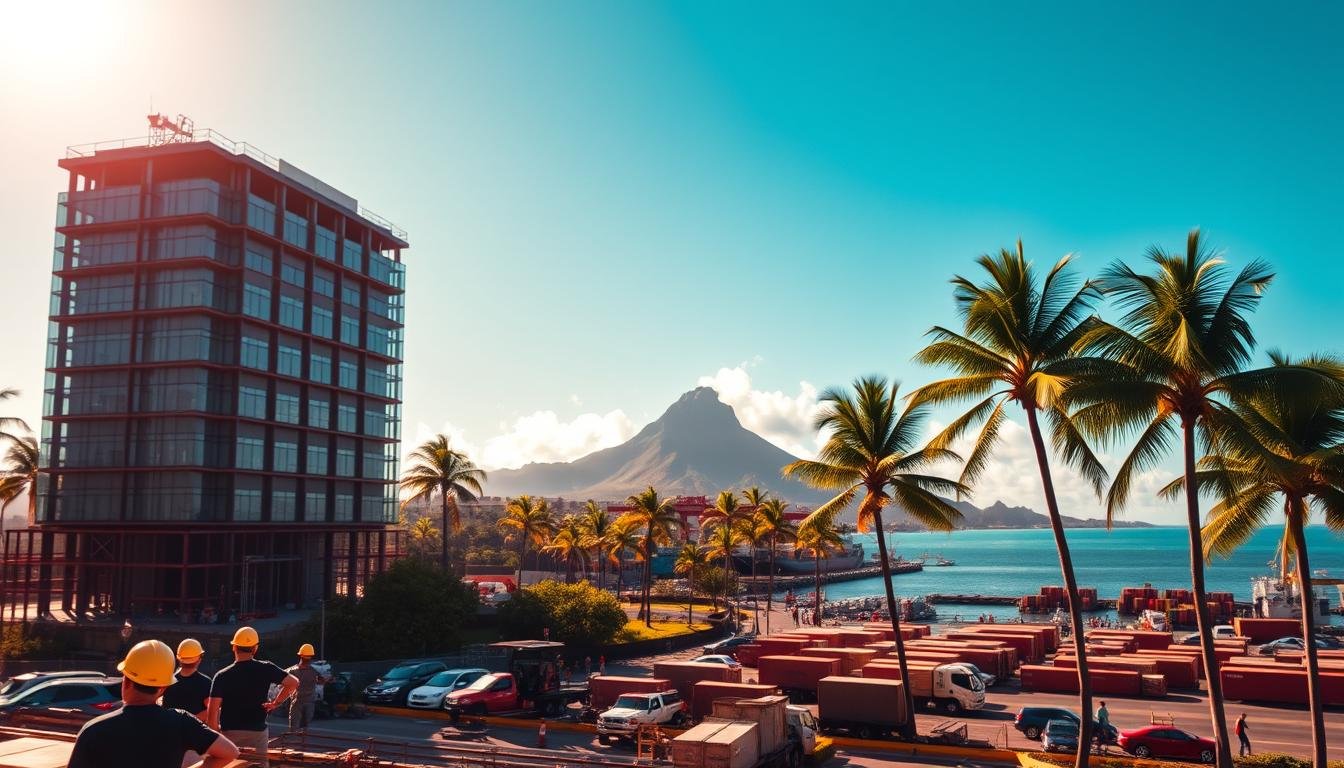In Hawaii, businesses with employees must have workers’ compensation insurance. This is a key protection for both employers and employees. It helps in case of workplace injuries or illnesses.
The Hawaii Department of Labor says this insurance gives wage loss compensation and medical care for work-related injuries. It makes sure employees get the help they need while they recover.

It’s important for businesses to understand workers comp hawaii. This knowledge helps them follow state laws and protect their workers. This article will cover the legal needs, benefits, and how to get hawaii workers comp insurance.
Key Takeaways
- Workers’ compensation insurance is mandatory for Hawaii businesses with employees.
- It provides wage loss compensation and medical care for work-related injuries.
- Understanding the legal requirements is key for following the law.
- Getting hawaii workers comp insurance protects both employers and employees.
- Following state regulations is vital for businesses.
Understanding Workers Compensation in Hawaii
Workers compensation insurance is key for businesses in Hawaii. It protects both employers and employees. It helps employees who get hurt or sick on the job by covering medical costs and lost wages.
What is Workers Compensation Insurance?
Workers compensation insurance helps employees who get hurt or sick at work. It’s a no-fault system, so benefits are given out without looking for who’s to blame. It covers medical bills, lost wages, and help to get better.
In Hawaii, employers must give certain benefits without looking for fault. This keeps things simple for employees to get help. It also protects employers from lawsuits.
The Importance of Workers Comp for Hawaii Employers
For Hawaii employers, workers compensation insurance is more than a law. It’s a way to keep the workplace safe and healthy. By having workers comp, employers can avoid expensive lawsuits. They also make sure their employees get the care they need if they get hurt or sick at work.
- Compliance with Hawaii state law
- Protection from lawsuits and financial liability
- Support for employees in need
- Promotion of a safe work environment
Legal Requirements for Workers Compensation Insurance Hawaii
Hawaii law requires most businesses to have workers’ compensation insurance. There are important exemptions and special cases employers need to know about.
Who Must Carry Workers Comp Coverage
In Hawaii, every business with employees must have workers’ compensation insurance. This rule applies to many industries, like construction and retail. The goal is to protect workers from injuries or illnesses on the job.
Exemptions and Special Cases
Even though the law is broad, there are exceptions for some people and businesses. It’s vital for Hawaii employers to understand these exceptions.
Independent Contractors vs. Employees
There’s a big difference between independent contractors and employees in Hawaii. The law sees workers as employees unless they clearly fit the criteria for independent contractors. Getting this wrong can cause legal trouble and fines.
Family Member Exemptions
Some family members, like those owning at least 50% of a business, might not need workers’ compensation. This rule applies to corporate officers and partners.
Sole Proprietor Considerations
Sole proprietors don’t have to get workers’ compensation insurance for themselves. But, they might want to for extra protection. This choice should depend on their business’s needs and how much risk they face.
Knowing these legal rules and exceptions is key for Hawaii businesses. It helps them follow state laws, protect their workers, and safeguard their own interests.
Benefits of Workers Compensation Insurance Hawaii
Workers Compensation Insurance in Hawaii is a big help for both employers and employees. It acts as a safety net when someone gets hurt at work. This insurance is key for businesses in Hawaii. It keeps the company and its workers financially safe.
Protection for Employers
For employers, Workers Compensation Insurance gives legal liability protection. It keeps them safe from lawsuits over work injuries. This is very important in Hawaii, where laws can be tricky and expensive.
Legal Liability Protection
With Workers Compensation Insurance, employers don’t have to worry about the costs of lawsuits over work injuries. This insurance makes sure workers get the help they need. It also lowers the chance of expensive lawsuits.
Financial Security
Workers Compensation Insurance also gives financial security to employers. It pays for medical bills and lost wages from work injuries. This helps businesses stay strong and keep running smoothly.
Benefits for Employees
Workers in Hawaii get a lot from Workers Compensation Insurance. It gives them medical coverage, wage replacement, and rehabilitation services when they need them.
Medical Coverage
It covers medical costs from work injuries. This means workers don’t have to pay a lot out of pocket for treatment.
Wage Replacement
If workers can’t work because of an injury, the insurance helps with their wages. This keeps their finances stable while they recover.
Rehabilitation Services
For workers needing help to get back to work, the insurance covers rehabilitation. This supports their recovery and helps them get back into the workforce.
How to Obtain Workers Comp Insurance in Hawaii
Getting workers’ compensation insurance in Hawaii involves several steps. Employers must follow these steps to meet state laws and protect their workers.
Step1: Determine Your Coverage Needs
First, you need to figure out how many employees you have and what they do. Most employers in Hawaii must have workers compensation insurance Hawaii. It’s important to know your workforce and the risks they face.
Think about your industry, the number of workers, and job hazards. This will help you decide how much coverage you need.
Step2: Explore Insurance Options
Hawaii employers have several ways to get Hawaii workers comp insurance. They can pick from private insurance, the state’s fund, or self-insurance with approval.
Private Insurance Carriers
Private insurance companies offer policies for different business needs. You can compare quotes and options to find the right one for your business.
Hawaii’s State Fund Option
The state fund is a good choice for some employers. It’s helpful if finding private insurance is hard.
Self-Insurance Requirements
Big or financially stable businesses might consider self-insurance. But, you need approval and must meet certain financial and administrative standards.
Step3: Apply for Coverage
After deciding on your coverage and insurance, apply for workers comp Hawaii. You’ll need to fill out an application, provide documents, and pay premiums to your chosen provider.
Make sure all your information is correct. Also, understand your policy’s terms and conditions well.

Cost Factors for Hawaii Workers Comp Insurance
The cost of workers’ compensation insurance in Hawaii is influenced by several key factors. Understanding these factors is key for businesses to manage their insurance expenses well.
Classification Codes and Rates
Classification codes play a big role in workers’ compensation insurance costs. These codes categorize businesses by industry and risk level. The rates are based on the work type and loss history. Businesses with higher-risk classifications pay more.
For example, construction companies pay more than office-based businesses. This is because construction is riskier.
Experience Modification Factors
The experience modification factor (EMR) is another big factor. It shows a company’s claims history compared to others in the same industry. An EMR of 1.0 is average. A lower EMR means a safer record, which can lower premiums.
A higher EMR means more claims, leading to higher premiums. Keeping a safe workplace and reducing claims can lower your EMR and insurance costs.
Ways to Lower Your Premiums
There are several ways Hawaii businesses can lower their workers’ compensation insurance premiums.
Safety Programs
Good safety programs can cut down on workplace injuries and illnesses. This leads to fewer claims and lower premiums.
Claims Management
Managing claims well is key. Quick reporting and thorough investigations can control costs and stop fraud.
Premium Audit Preparation
Being ready for premium audits is important. Accurate payroll records and following classification codes can prevent overpaying for insurance.
By understanding and managing these factors, Hawaii businesses can cut their insurance costs. This also improves workplace safety.
The Claims Process for Hawaii Workplace Injuries
When a workplace injury happens in Hawaii, knowing the claims process is key. It’s important for both employers and employees. The steps include immediate action, reporting, and resolving the claim, all following specific rules.
Step1: Immediate Response to Injuries
The first thing to do is respond quickly to the injury. Employers need a plan for handling injuries. This includes giving first aid and making sure the injured gets medical help right away.
“The sooner the employer acts, the easier the claims process will be,” experts say.
Step2: Reporting Requirements
Reporting injuries is a big part of the claims process. Both employers and employees play a role.
Employer Reporting Deadlines
Employers must tell the Disability Compensation Division about injuries within 7 working days. Meeting this deadline is important for following Hawaii’s workers’ compensation rules.
Employee Notification Procedures
Employees must tell their employer right away after getting hurt. Quick notice helps start the claims process without any hold-ups.
Step3: Claims Management and Resolution
After reporting the injury, managing and solving the claim comes next. The insurance carrier checks the claim, decides if it’s valid, and gives the injured employee the right benefits. Handling claims well is essential for a good outcome.

Efficient claims processing is key for injured workers to get the benefits they deserve. By knowing and following the claims process, employers can help their employees and follow state rules.
“Knowing how Hawaii’s workers’ compensation works can really affect a claim’s outcome,” experts say. This shows how important it is to understand the claims process.
Compliance and Penalties in Hawaii
Workers’ compensation insurance is a must in Hawaii. It protects both employers and employees. Following the state’s rules is key to avoid big problems.
Consequences of Non-Compliance
Not following Hawaii’s rules can lead to big fines. Employers need to know the risks to keep their business safe.
Financial Penalties
Not having workers’ comp can cost up to $100 per employee per day. For a company with 50 workers, that’s $5,000 a day. This can really hurt a business’s wallet.
Legal Consequences
Not following the rules can also lead to lawsuits. This can hurt a company’s finances and reputation even more.
Audits and Enforcement
Hawaii’s Department of Labor checks on businesses to make sure they follow the rules. Employers need to be ready to show they are in compliance.
What to Expect During an Audit
During an audit, employers will be asked about their insurance and employee data. Having this info ready is very important.
How to Prepare for Inspections
To get ready for an audit, employers should check their insurance and employee records. Being prepared can make the audit go smoother.
Understanding the need for compliance and being ready for audits is important. It helps protect a business and its workers. Following the rules is a big part of being a responsible business owner.
Best Practices for Managing Workers Comp in Hawaii
Managing workers’ compensation insurance well is key for Hawaii businesses. It helps cut down on workplace injuries and handles claims better. By following best practices, companies can lower costs, boost employee health, and follow Hawaii’s workers’ compensation rules.
Implementing Safety Programs
Safety programs are vital for stopping workplace injuries and lowering claims. They should include:
- Regular safety training for employees to spot and avoid hazards.
- Hazard identification and correction to keep the workplace safe.
Training and Education
It’s important to give employees regular training and education to avoid accidents. This training covers how to use equipment, safety steps, and what to do in emergencies.
Hazard Identification
Finding and fixing workplace hazards is key to avoiding injuries. Employers should do workplace inspections often. This helps keep the workplace safe for everyone.
Return-to-Work Strategies
Good return-to-work plans can cut down on claim costs and time. This includes:
- Modified duty programs that let employees work in a smaller way.
- Communication between employers, employees, and doctors to smoothly get them back to work.
Record-Keeping Requirements
Keeping accurate records is vital for managing claims and following Hawaii’s rules. Employers need to keep detailed records of:
- Workplace injuries and illnesses.
- Workers’ compensation claims and payments.
- Safety training and fixing hazards.

Conclusion
Workers’ compensation insurance is key in Hawaii for both employers and employees. It’s not just a law but a big part of keeping a business safe.
Knowing the rules for workers compensation insurance Hawaii helps businesses stay legal and avoid fines. Also, having good safety plans and helping workers get back to work can cut costs and make workplaces safer.
In short, Hawaii workers comp insurance is vital for keeping employees safe and businesses financially sound. By focusing on workers’ compensation and following best practices, Hawaii businesses can make their workplaces safer and more productive.
Sources
For more information on workers’ compensation insurance in Hawaii, check out these sources:
The Hawaii Department of Labor and Industrial Relations has lots of info. They cover benefits and what’s needed for coverage.
For more, visit the Hawaii Department of Commerce and Consumer Affairs website. They offer tips on workplace coverage and insurance rules.
Also, the National Council on Compensation Insurance website is a great resource. They have data on hawaii workers injury benefits and hawaii workplace coverage.
FAQ
What is workers’ compensation insurance, and why is it necessary for Hawaii businesses?
Workers’ compensation insurance helps employees who get hurt on the job or fall ill because of their job. It’s key for Hawaii businesses. It keeps employers safe from lawsuits and helps injured workers, following state laws.
Who is required to have workers’ compensation insurance in Hawaii?
In Hawaii, any employer with one or more employees must have workers’ compensation insurance. This includes both full-time and part-time workers, but not independent contractors.
What are the benefits of workers’ compensation insurance for employees in Hawaii?
It offers medical care, pay while they’re out, and help to get back to work if they’re hurt or sick on the job. It’s all about supporting them while they recover.
How do I obtain workers’ compensation insurance in Hawaii?
First, figure out how much coverage you need. Then, look at options from private companies or the state fund. Apply by sharing details about your business and workers.
What factors influence the cost of workers’ compensation insurance in Hawaii?
The cost depends on several things like job type, past claims, and how safe your workplace is. Keeping your workplace safe and handling claims well can lower your premiums.
What is the process for filing a workers’ compensation claim in Hawaii?
Start by acting fast if someone gets hurt. Then, tell your employer and the insurance company. The claim will go through medical treatment, pay, and help to get back to work.
What are the consequences of not having workers’ compensation insurance in Hawaii?
Without it, you face big fines and could even get sued by injured workers. It’s a serious risk for your business.
How can Hawaii businesses reduce their workers’ compensation insurance premiums?
Lower premiums by making your workplace safer and handling claims well. Also, be ready for audits to ensure you’re rated correctly.
What are the best practices for managing workers’ compensation insurance in Hawaii?
Focus on safety, have plans for workers to return to their jobs, keep accurate records, and follow state rules. This helps prevent injuries and manage claims well.
